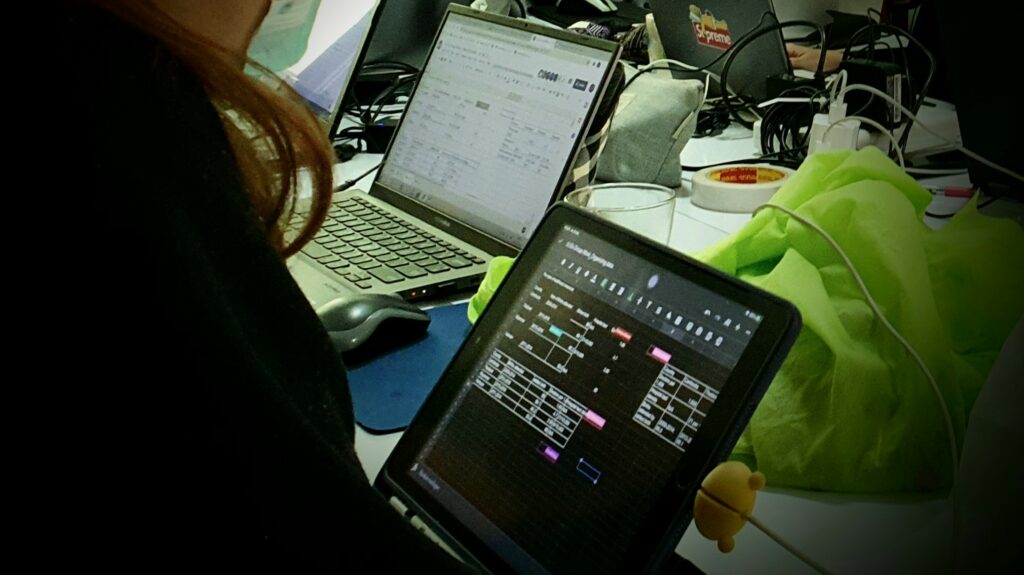หลักสูตรอบรมทักษะความรอบรู้ด้านข้อมูล
การมีส่วนร่วมในการเคลื่อนไหวอย่างเปิดเผยจำเป็นต้องมีทักษะความรอบรู้ด้านข้อมูล อย่างที่ทราบกันว่าภูมิภาคลุ่มน้ำโขงยังมีกลุ่มประชากรรที่มีทักษะความรอบรู้ด้านข้อมูลต่ำ และมีโอกาสในการสร้างทักษะที่จำเป็นเหล่านี้ไม่เท่ากัน
การฝึกอบรมทักษะความรอบรู้ข้อมูลได้รับการพัฒนาโดย Open Development Thailand สำหรับภาคส่วนเฉพาะในลุ่มน้ำโขง เพื่อให้มีส่วนร่วมในการรวบรวมและเผยแพร่ข้อมูลอย่างมีประสิทธิภาพมากขึ้น
หลักสูตรนี้เป็นการอบรมทั้งสิ้น 15 วัน (แบ่งเป็นการอบรม 5 วันต่อเนื่อง เป็นเวลาสามเดือน) ซึ่งเน้นการใช้ข้อมูลเพื่อบอกเล่าเรื่องราว ค้นหาแหล่งข้อมูลที่เชื่อถือได้ และจัดการข้อมูลให้เป็นระบบ เพื่อวิเคราะห์และสื่อสารข้อมูลเชิงลึกจากข้อมูลได้ ซึ่งเน้นกิจกรรมลงมือปฏิบัติโดยใช้ตัวอย่างชุดข้อมูลและการวิเคราะห์ข้อมูลเพื่อสำรวจอุปสรรคต่อการปรับปรุงสวัสดิการความเป็นอยู่และการยอมรับในสังคม
กลุ่มเป้าหมายของเรา ได้แก่ กลุ่มชนเผ่าพื้นเมือง และกลุ่มสตรีและเยาวชนในประเทศไทย

ชั่วโมงปฎิบัติในหลักสูตรทักษะความรอบรู้ด้านข้อมูล จ.เชียงใหม่. รูปภาพโดย Open Development Thailand. CC BY-SA 4.0
หลักสูตรอบรมความรอบรู้ด้านข้อมูลนี้ได้รับการแปลและปรับเนื้อหาให้เข้ากับปริบทของประเทศไทย EWMI-ODI และผู้จัดทำเนื้อหาหลักสูตรขอขอบคุณหลักสูตรต้นฉบับ World Bank’s Data Literacy Program ที่อนุญาตให้ใช้หลักสูตร และผู้ที่เกี่ยวข้องต่าง ๆ ที่ให้คำปรึกษาเพื่อการพัฒนาหลักสูตรนี้สำหรับประเทศไทย
โมดูลที่ 1: นำเสนอเรื่องเล่าจากหลักฐาน
ส่วนแรกนี้จะมาทำความรู้จักกับ “ข้อมูล (Data)” และวิธีการใช้งานข้อมูลเพื่อสร้างเรื่องเล่าเกี่ยวกับป่าไม้ นอกจากนี้จะอธิบายว่าข้อมูลเปิดคืออะไร และมีผลกระทบต่อนโยบายในระดับชาติได้อย่างไร ผู้เข้าอบรมจะได้เห็นตัวอย่างข้อมูลและหลักฐานจากภาคส่วนต่าง ๆ ที่นำมาใช้สร้างเรื่องเล่า ผ่านการวิเคราะห์และวิจัยเกิดเป็นกรณีศึกษาจำนวนมาก
>> วิธีการใช้ข้อมูลเพื่อเรื่องเล่าที่สาธารณะสนใจ
>> ข้อมูล คือ อะไร?
>> ใช้ข้อมูลเล่าเรื่องให้ได้ผล
>> เล่าเรื่องด้วยข้อมูลเฉพาะภาคส่วน
>> อธิปไตยด้านข้อมูลชนเผ่าพื้นเมือง
โมดูลที่ 2: ค้นหา รวบรวมข้อมูล และจัดทำรูปแบบข้อมูลที่เหมาะสม
ส่วนที่สองนี้จะนำเสนอความรู้เบื้องต้นเกี่ยวกับรูปแบบข้อมูล ทักษะในการค้นหาข้อมูลออนไลน์ เครื่องมือตัวอย่างที่ใช้ในการรวบรวมข้อมูล และแนวคิดในการแปลงข้อมูลเป็นเรื่องเล่า หลักสูตรจะเริ่มจากการทบทวนรูปแบบข้อมูลต่าง ๆ นำเสนอเทคนิคที่ใช้ในการค้นหาข้อมูล แปลงและประมวลผลข้อมูลที่อยู่ในรูปแบบที่แตกต่างกัน และเสนอแนะวิธีพัฒนาสมมติฐานและคำถามสำหรับการเล่าเรื่องด้วยข้อมูล เราสามารถแนะนำเครื่องมือโอเพนซอร์สที่สนับสนุนการรวบรวมข้อมูลให้คุณได้ในกรณีที่คุณต้องการ เช่น Mapeo – Mobile เป็นต้น
>> รูปแบบข้อมูลที่พบบ่อย
>> ค้นหาข้อมูลออนไลน์
>> เครื่องมือเก็บข้อมูล: Mapeo
>> เก็บข้อมูลด้วย KoBoCollect
>> แนะนำ Thai OCR
>> เทคนิคใช้เว็บข้อมูลเปิด (ODM/ODT)
>> แหล่งข้อมูลทางเลือก
โมดูลที่ 3: เข้าใจข้อมูล
ส่วนที่สามนี้ จะแนะนำแนวคิดพื้นฐานของการจัดระเบียบและจัดการข้อมูลให้สะอาดเหมาะแก่การนำไปใช้งาน และเรียนรู้การตั้งคำถามที่จะช่วยให้คุณประเมินแหล่งที่มาของข้อมูลได้ นอกจากนี้ เนื้อหายังจะครอบคลุมการคำนวณพื้นฐานและหลักเบื้องต้นเกี่ยวกับสถิติ ทั้งนี้ เรื่องจริยธรรมและข้อผิดพลาดที่อาจเกิดขึ้นได้จากการทำงานกับข้อมูลจะมีการกล่าวถึงด้วย
>> จัดระเบียบข้อมูล
>> ทบทวนสูตรคณิตศาสตร์อย่างง่าย
>> แนวทางลดความซับซ้อนของข้อมูลเชิงลึก
>> เรียนรู้การใช้งาน Google Sheets
>> สถิติที่ควรรู้
โมดูลที่ 4: การสร้างภาพจากข้อมูล
หลักสูตรหัวข้อนี้จะแนะนำพื้นฐานการสื่อสารที่มีประสิทธิภาพด้วยการสื่อสารข้อมูลด้วยภาพ ผ่านตัวอย่างเรื่องเล่าที่สื่อสารข้อมูลด้วยเทคนิคการนำเสนอที่น่าสนใจและเครื่องมือที่ถ่ายทอดความรู้และข้อมูลสถิติ ผู้เข้าร่วมจะได้รับการฝึกฝนในการใช้ซอฟต์แวร์การสร้างภาพข้อมูล อาทิเช่น Datawrapper Flourish และ Google Data Studio หรือ Tableau
>> เลือกประเภทกราฟให้เหมาะกับงาน
>> ทฤษฎีสีและการออกแบบ
>> แนะนำการใช้งาน Datawrapper
>> สร้างแผนที่ด้วย Datawrapper
>> แนะนำการใช้งาน Flourish
>> อินโฟกราฟิก
>> แนะนำการใช้งาน Piktochart
>> หลักการออกแบบ Dashboard
>> Google Data Studio พื้นฐานและการสร้างแผนที่
>> แนะนำการใช้งาน Tableau
โมดูลที่ 5: คิดอย่างผู้สื่อข่าวที่ใช้ข้อมูล
หลังจากได้พัฒนาทักษะการใช้ข้อมูลจากเนื้อหาก่อนหน้านี้แล้ว ผู้เข้าอบรมจะได้ลงมือปฏิบัติกับชุดข้อมูลที่เกี่ยวข้องตามกลุ่ม เพื่อสร้างเรื่องเล่าโดยใช้ชุดข้อมูลเหล่านั้น ผู้เชี่ยวชาญในกระบวนการนี้จะให้คำแนะนำผ่านกระบวนการคิดอย่างผู้สื่อข่าวและวิเคราะห์ชุดข้อมูลเพื่อประกอบเรื่องเล่า
>> ประเมินผลการตีความข้อมูล
>> พื้นฐานการออกแบบที่คำนึงถึงผู้ใช้เป็นหลัก
>> กลเม็ดสำหรับ Data Visualization
>> เครื่องมือของผู้สื่อข่าว Juxtapose, RAW, TimelineJS, StorylineJS, Onodo
โมดูลที่ 6: ความปลอดภัยและสิทธิข้อมูลดิจิทัล
การทำงานกับข้อมูลในยุคดิจิทัลสร้างความกังวลเกี่ยวกับความเป็นส่วนตัวและสิทธิ์ความเป็นเจ้าของข้อมูล เนื้อหาส่วนนี้จะแนะนำวิธีปฏิบัติด้านความปลอดภัยออนไลน์เมื่อใช้เทคโนโลยี รวมถึง สมาร์ทโฟน คอมพิวเตอร์ ชุดข้อมูล และอินเทอร์เน็ตในชีวิตประจำวัน ผู้เข้าอบรมจะได้เรียนรู้เกี่ยวกับแบบจำลองภัยคุกคาม การประเมินความเสี่ยง และวิธีการตรวจสอบความปลอดภัยของข้อมูล
>> ความปลอดภัยดิจิทัลและความเป็นส่วนตัว
>> จริยธรรมข้อมูล
เรื่องเล่าที่เกี่ยวข้อง:
ความรอบรู้ด้านข้อมูล (Data Literacy) เป็นทักษะในการอ่าน ทำความเข้าใจข้อมูล ทำงานกับข้อมูล วิเคราะห์ข้อมูล และใช้ข้อมูลเป็นหลักฐานสนับสนุน ในสังคมดิจิทัลปัจจุบัน ความรอบรู้ด้านข้อมูลเป็นสิ่งจำเป็นสำหรับหน่วยงานและบุคคลที่ต้องรู้เ่ท่าทันและมีทักษะใช้ข้อมูลให้เป็น โดยใช้ทักษะการวิเคราะห์เชิงปริมาณ (เช่น ทางคณิตศาสตร์และสถิติ) ในการอ่านและเข้าใจข้อมูล ดังนั้น ด้วยทักษะความรอบรู้ด้านข้อมูลจะสามารถนำเสนอเรื่องราวที่อิงหลักฐานเชิงลึกได้มากขึ้น
การอนุญาต:
เอกสารการฝึกอบรมหลักสูตร Data Literacy ของ Open Development Initiative พัฒนาจากคู่มือการอบรม Introduction to the Data Literacy โดย Eva Constantaras ภายใต้ Sudan Evidence-Base Program (EBP) ซึ่งเป็นความร่วมมือระหว่างกระทรวงการวางแผนเศรษฐกิจและการคลัง กรมการพัฒนาระหว่างประเทศ (DFID) ของสหราชอาณาจักร และธนาคารโลก โดยมีการถ่ายทอดเป็นภาษาท้องถิ่นในกลุ่มประเทศลุ่มน้ำโขง ดังนี้ หลักสูตรอบรมภาษาเมียนมาร์จัดทำโดย Yan Naung Oak และองค์กร Phandeeyar ซึ่งได้รับการสนับสนุนจาก Foreign, Commonwealth & Development Office (FCDO) ของสหราชอาณาจักร สำนักงานความช่วยเหลือเพื่อการพัฒนาแห่งออสเตรเลีย กระทรวงการต่างประเทศแห่งเดนมาร์ก และกระทรวงการต่างประเทศแห่งฟินแลนด์ หลักสูตรอบรมภาษากัมพูชาจัดทำโดย Yan Oak และ Open Development Cambodia โดยได้รับการสนับสนุนจากโครงการเสริมสร้างภาคประชาสังคมกัมพูชาของ USAID ในส่วนของเนื้อหาหลักสูตรสำหรับเวอร์ชันนี้ได้ปรับปรุงเพื่อให้สอดคล้องกับบริบทและเพิ่มเติมเนื้อหาตามความต้องการที่แตกต่างไป โดยรวมประเด็นอำนาจอธิปไตยของข้อมูลพื้นเมืองและการเก็บข้อมูลด้วยแอปพลิเคชัน เช่น MAPEO ที่สนับสนุนการจัดทำโดย Digital Democracy หลักสูตรภาษาไทยนี้พัฒนาโดยเสาวลักษณ์ จริงจังวิสุทธิ์ และ Open Development Mekong ภายใต้โครงการ Voices for Mekong Forests และผู้บริจาคอื่น ๆ เอกสารการนำเสนอนี้ได้รับอนุญาตภายใต้ใบอนุญาต Creative Commons Attribution-NonCommercial-ShareAlike 4.0 International
คุณมีอิสระที่จะ:
- แบ่งปัน – ทำสำเนาและเผยแพร่เอกสารไม่ว่าจะเป็นช่องทางหรือรูปแบบใด ๆ
- ดัดแปลง – ผสมผสานเนื้อหา ปรับเปลี่ยน และต่อยอดจากเอกสารนำเสนอนี้
- แสดงที่มา – คุณต้องให้เครดิตที่เหมาะสม ระบุลิงก์ไปยังใบอนุญาต และระบุว่ามีการเปลี่ยนแปลงใด คุณอาจดำเนินการในลักษณะที่สมเหตุสมผล แต่ไม่ใช่ด้วยวิธีที่ชี้นำว่าผู้อนุญาตรับรองคุณหรือการใช้งานของคุณ
- ไม่ใช่เชิงพาณิชย์ – คุณไม่สามารถใช้เอกสารนำเสนอนี้เพื่อวัตถุประสงค์เชิงพาณิชย์
- แชร์เหมือนกัน – หากคุณดัดแปลง ปรับเปลี่ยน หรือต่อยอดจากเนื้อหาเดิม คุณต้องเผยแพร่ผลงานของคุณภายใต้ใบอนุญาตเดียวกับต้นฉบับ
- ไม่มีข้อจำกัดเพิ่มเติม – คุณไม่สามารถใช้เงื่อนไขทางกฎหมายหรือมาตรการทางเทคโนโลยีเพื่อจำกัดผู้อื่นจากข้อกำหนดที่ระบุไว้ในใบอนุญาต
ตัวอย่างการระบุแหล่งที่มา:
เอกสารนี้ดัดแปลงมาจากคู่มือการอบรม Introduction to Data Literacy ของธนาคารโลก โดย Eva Constantaras และปรับปรุงโดย Yan Oak, Open Development Cambodia และ Open Development Initiative ซึ่งได้รับอนุญาตภายใต้ Creative Commons Attribution-NonCommercial-ShareAlike 4.0 International

